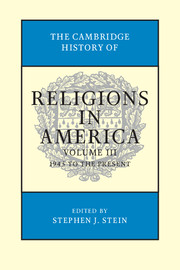Book contents
- Frontmatter
- SECTION I THE POSTWAR RELIGIOUS WORLD, 1945 AND FOLLOWING
- 1 Dangerous and Promising Times: American Religion in the Postwar Years
- 2 Public Religion in Canada from Mackenzie King to Trudeau: Entering the Age of Pluralism, 1945–1982
- 3 Religion in Mexico, 1945–2010
- 4 American Judaism in the Postwar Period
- 5 Suburbanization and Religion
- 6 The Postwar Religious World, 1945 and Following: The Case of Asian Religions in the United States
- SECTION II CONTROVERSIAL ISSUES IN TRANSITIONAL TIMES
- SECTION III THE WORLD’s RELIGIONS IN AMERICA
- SECTION IV RELIGIOUS AND CULTURAL CONFLICT IN AMERICA
- SECTION V NEW AND CONTINUING RELIGIOUS REALITIES IN AMERICA
- SECTION VI CONCLUDING ESSAYS
- Index
- References
4 - American Judaism in the Postwar Period
from SECTION I - THE POSTWAR RELIGIOUS WORLD, 1945 AND FOLLOWING
Published online by Cambridge University Press: 28 July 2012
- Frontmatter
- SECTION I THE POSTWAR RELIGIOUS WORLD, 1945 AND FOLLOWING
- 1 Dangerous and Promising Times: American Religion in the Postwar Years
- 2 Public Religion in Canada from Mackenzie King to Trudeau: Entering the Age of Pluralism, 1945–1982
- 3 Religion in Mexico, 1945–2010
- 4 American Judaism in the Postwar Period
- 5 Suburbanization and Religion
- 6 The Postwar Religious World, 1945 and Following: The Case of Asian Religions in the United States
- SECTION II CONTROVERSIAL ISSUES IN TRANSITIONAL TIMES
- SECTION III THE WORLD’s RELIGIONS IN AMERICA
- SECTION IV RELIGIOUS AND CULTURAL CONFLICT IN AMERICA
- SECTION V NEW AND CONTINUING RELIGIOUS REALITIES IN AMERICA
- SECTION VI CONCLUDING ESSAYS
- Index
- References
Summary
On 12 June 1945 a group of Orthodox rabbis, members of an organization of Yiddish-speaking traditionalists called Agudath Harabbanim (Union of Orthodox Rabbis of the United States and Canada), assembled at the McAlpin Hotel in Manhattan. Americans, and especially Jews, had celebrated the defeat of Nazi Germany on Victory over Europe Day only a month earlier. But the end was not in sight. World War II still raged against Japan. Yet a decision to pass judgment on Mordecai M. Kaplan, a controversial and influential rabbi, could not wait for peace. Kaplan had published his magnum opus in 1934, Judaism as a Civilization: Toward a Reconstruction of American-Jewish Life, as well as several subsequent volumes of religious thought. Neither these books nor the establishment of the Jewish Reconstructionist Foundation to promote his philosophy of Reconstructionism merited a court of judgment despite their radical ideas. However, when Kaplan published a version of the Sabbath Prayer Book, he crossed a line. The solidarity the war had produced among Americans of all faiths and no faith – to paraphrase Rabbi Roland B. Gittelsohn’s famous sermon dedicating the Fifth Marine Division Cemetery on Iwo Jima – inspired Kaplan and his coeditor. As one of three fighting faiths of democracy, Judaism needed to adapt. “Modern-minded Jews,” they wrote in the prayer book’s introduction, “can no longer believe, as did their fathers, that the Jews constitute a divinely chosen nation.” The Agudath Harabbanim violently disagreed. They opposed such accommodations to democratic ideals.
- Type
- Chapter
- Information
- The Cambridge History of Religions in America , pp. 82 - 105Publisher: Cambridge University PressPrint publication year: 2009



